Resources
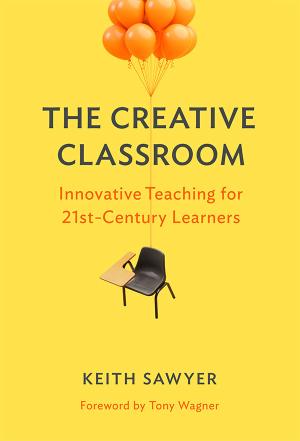
The Creative Classroom presents an original, compelling vision of schools where teaching and learning are centered on creativity. Drawing on the latest research as well as his studies of jazz and improvised theater, Sawyer describes curricula and classroom practices that will help educators get started with a new style of teaching, guided improvisation, where students are given freedom to explore within structures provided by the teacher. Readers will learn how to improve learning outcomes in all subjects—from science and math to history and language arts—by helping students master content-area standards at the same time as they increase their creative potential. This book shows how teachers and school leaders can work together to overcome all-too-common barriers to creative teaching—leadership, structure, and culture—and collaborate to transform schools into creative organizations. (From the Publisher)
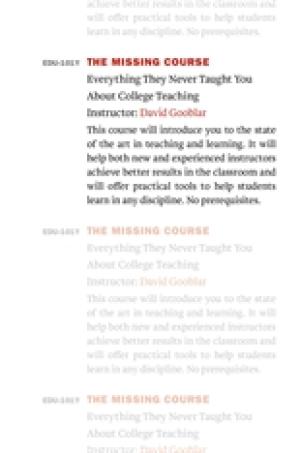
Professors know a lot, but they are rarely taught how to teach. The author of the Chronicle of Higher Education’s popular “Pedagogy Unbound” column explains everything you need to know to be a successful college instructor. College is changing, but the way we train academics is not. Most professors are still trained to be researchers first and teachers a distant second, even as scholars are increasingly expected to excel in the classroom. There has been a revolution in teaching and learning over the past generation, and we now have a whole new understanding of how the brain works and how students learn. But most academics have neither the time nor the resources to catch up to the latest research or train themselves to be excellent teachers. The Missing Course offers scholars at all levels a field guide to the state of the art in teaching and learning and is packed with invaluable insights to help students learn in any discipline. Wary of the folk wisdom of the faculty lounge, David Gooblar builds his lessons on the newest findings and years of experience. From active-learning strategies to course design to getting students talking, The Missing Course walks you through the fundamentals of the student-centered classroom, one in which the measure of success is not how well you lecture but how much students learn. Along the way, readers will find ideas and tips they can use in their classrooms right away. (From the Publisher)
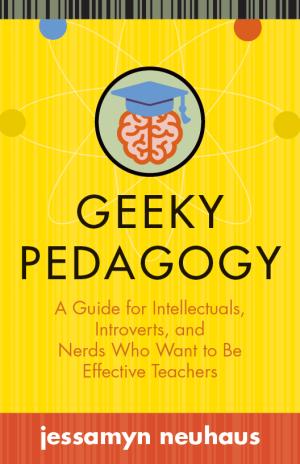
Geeky Pedagogy is a funny, evidence-based, multidisciplinary, pragmatic, highly readable guide to the process of learning and relearning how to be an effective college teacher. It is the first college teaching guide that encourages faculty to embrace their inner nerd, inviting readers to view themselves and their teaching work in light of contemporary discourse that celebrates increasingly diverse geek culture and explores stereotypes about super-smart introverts. Geeky Pedagogy avoids the excessive jargon, humorlessness, and endless proscriptions that plague much published advice about teaching. Neuhaus is aware of how embodied identity and employment status shape one’s teaching context, and she eschews formulaic depictions of idealized exemplar teaching, instead inviting readers to join her in an engaging, critically reflective conversation about the vicissitudes of teaching and learning in higher education as a geek, introvert, or nerd. Written for the wonks and eggheads who want to translate their vast scholarly expertise into authentic student learning, Geeky Pedagogy is packed with practical advice and encouragement for increasing readers’ pedagogical knowledge. (From the Publisher)
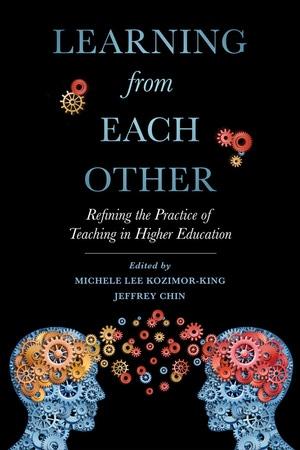
Click Here for Book Review Instructors interested in SOTL will appreciate the wide range of practical pedagogical strategies presented in this book. - Bernadette McNary-Zak, Rhodes College Learning from Each Other includes 20 original chapters written by well-known experts in the field of teaching and learning. Conceived for both new and experienced faculty at community colleges, four-year institutions, and research-intensive universities, the volume also addresses the interests of faculty and graduate students in programs designed to prepare future faculty and campus individuals responsible for faculty professional development. With the aim of cultivating engagement amongst students and deepening their understanding of the content, topics covered in this edited volume include: - employing the science of learning in a social science context - understanding the effects of a flipped classroom on student success - pedagogical techniques to create a community of inquiry in online learning environments - the risks and rewards of co-teaching - reaching and teaching "non-traditional" students -f acilitating learning and leadership in student team projects - connecting students with the community through research - issues of assessment, including backward design, developing and using rubrics, and defining and implementing the scholarship of teaching and learning Through Learning from Each Other, all faculty who care about their teaching, but especially faculty in the social sciences, can successfully employ curricular innovations, classroom techniques, and advances in assessment to create better learning environments for their students. (From the Publisher)
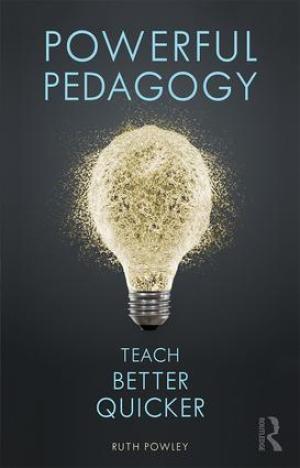
In Powerful Pedagogy, Ruth Powley, Love Learning Ideas blogger and experienced teacher and school leader, debunks teaching and learning myths and shows how the more we know about pedagogy, the more able we are to make informed and efficient choices about our practice, saving ourselves valuable time. Focusing on building sequences of learning rather than one-off lessons, it is an antidote to ‘quick fix’ books, empowering teachers as professionals in possession of ‘powerful’ pedagogical knowledge that can be used to improve teaching in a sustainable way. Powerful Pedagogy draws extensively from a wide range of educational writers and research, offering an accessible synthesis of what really works in the classroom. Together with strategies to put theories and research into practice, each chapter contains a handy list of questions for the reflective practitioner. It explores reasons for the confusion over what constitutes effective pedagogy in recent years and presents practical research-based solutions, outlining successful and efficient: Modelling of excellence Explaining for understanding Practising to fluency Questioning as assessment Testing to permanency Marking for improvement Effective planning of lessons and curriculum sequences. Powerful Pedagogy allows teachers to understand how to make the best choices about what works in the classroom, improving the quality of teaching. It is an essential companion for trainee and experienced teachers in all sectors, and for school leaders and educational trainers. (From the Publisher)
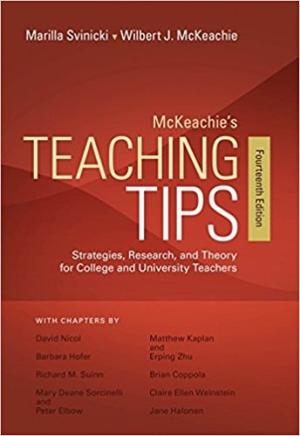
This indispensable handbook provides helpful strategies for dealing with both the everyday challenges of university teaching and those that arise in efforts to maximize learning for every student. The suggested strategies are supported by research and adaptable to specific classroom situations. Rather than suggest a "set of recipes" to be followed mechanically, the book gives instructors the tools they need to deal with the ever-changing dynamics of teaching and learning. Available with InfoTrac Student Collections http://gocengage.com/infotrac.
Podcast Series. A podcast exploring conversations of Critical Digital Pedagogy, listening for ways to empower students and champion learning.
Asynchronous online instruction has become increasingly popular in the field of religious studies. However, despite voluminous research on online learning in general and numerous articles on online theological instruction, there has been little discussion of how to effectively design and deliver online undergraduate courses in religious studies. Drawing on recent research, experiences teaching and learning online, and interviews with colleagues, this paper discusses key principles of effective online instruction. It recommends instructors focus on humanizing their course website, “chunking” their course content, making their approach to the study of religion clear, structuring and monitoring online discussions, prioritizing prompt and constructive feedback, and making course material relevant to learners.